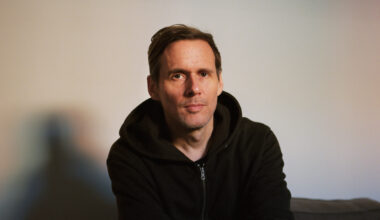Marking a return to the fray with their second album, ‘I’m All Ears’, Let’s Eat Grandma dip their biscuits into waters new – musically and quite literally. We tag along for the ride…
Jenny Hollingworth and Rosa Walton from Let’s Eat Grandma are eating rich tea biscuits, and Jenny is dipping hers into a cup of water.
“I’m confused about this,” says Rosa.
“Well, they don’t have soya milk here and I don’t like breakfast tea without soya milk,” responds Jenny. “And not all of us can afford teabags.”
There’s a pause before they both erupt into laughter. Interviewing Let’s Eat Grandma, it seems, is often like this. It’s almost as if you’re eavesdropping on a private conversation, a narrative loaded with banter and in-jokes that only makes sense to themselves.
Their first album, 2016’s well-received ‘I, Gemini’ positioned the then 17-year-olds as twins that just happened to have been born into different families, playing on the inseparable bond and firm friendship that has existed between them for most of their lives. Still in their teens, the duo have just released the follow-up to their debut, ‘I’m All Ears’, pushing their music in unexpected electronic directions as they move along newly-discovered pathways.
“I remember the first time we met,” says Rosa. “We were on the same table in our reception class in Norwich, and Jenny was drawing an orange and blue snail. I liked the snail, and I thought that if I make friends with her now, then maybe in the future we can start a band. And so we became friends.”
It may be a wry summary of how Let’s Eat Grandma came about, but it isn’t that far from the truth. By the age of 13, they were hanging out every weekend, initially playing earnest covers on ukulele and guitar and slowly but surely piecing together the material that would form ‘I, Gemini’. For their band name they chose something that made them both laugh – a classroom lesson about how the incorrect placement of a comma can materially alter the meaning of a sentence (“Let’s eat, grandma” versus “Let’s eat grandma”).
As a proposition, ‘I, Gemini’ was loaded with hybrids – uke, guitar, viola, mandolin, glockenspiel, recorder, home-grown electronics and overlapping vocals full of urban pronunciation. Its broad-minded fantastical lyrical themes, its perpetual soundclash between the organic and the electronic, felt perfectly poised; playful and free, but never without order.
Key to the album’s success was the notion that Hollingworth and Walton were identical in everything but DNA They’d appear on stage wearing the same clothes, hair occasionally intertwined and singing with voices where the affectations made it hard to discern which of the pair was singing.
“We created that idea,” admits Jenny, “and it became how the album got marketed, but it got taken a bit too far. We’ve always been close, but I almost feel, on a personal level, that the constant comparisons to one another, and not being able to have your own space as a person, has had quite a negative effect, especially as we’ve got older.
“We’ve naturally moved away from the twin image thing,” agrees Rosa, “even though we’ve stayed every bit as close as friends. If anything we’re even closer now because of all the time we’ve spent together on tour and writing the new album together.”
‘I’m All Ears’ is, at least outwardly, a very different record from its predecessor, and even a cursory listen suggests that Let’s Eat Grandma have moved in a squarely electronic pop direction. The pair don’t necessarily think it’s that different, and confidently brush off any notion that this is that hoary old music cliché, the difficult second album.
Two major points differentiate ‘I’m All Ears’ from its predecessor – the more mature lyrical themes and that pronounced use of electronics. Though synths were a feature of the first album, they were less prominent than the organic, almost folksy arrangements that surrounded them. For the most part, ‘I’m All Ears’ is the reverse – traditional instrumentation still abounds, but this time it’s the electronics that have them surrounded.
“I think that interest in electronics has always been there to be honest,” says Jenny. “But I guess it’s got stronger. Other than pop, electronic music is one of my favourite genres, so it makes sense that it would have quite a big influence.”
They also found themselves composing using Logic, which they didn’t have access to for the first record.
“I don’t think we started using Logic to make it easier to write the songs, often you end up using that to create something that sounds a bit dated… unless you bring in the analogue synths.”
And yet, even though it was largely written using software, ‘I’m All Ears’ has the distinctive warmth and texture that comes from embracing analogue kit. It suggests that not only did Let’s Eat Grandma spend the two years since their debut embracing technology, they may just have amassed a studio full of old synths?

“I wish,” says Jenny mournfully. “We’re definitely not rich enough for that.”
In the event, synth envy wasn’t a major issue.
“David Wrench, who produced most of the record, has all of the analogue synths that we’d ever want to use, stuff like the ARP 2600,” says Rosa.
Wrench had been a regular at Let’s Eat Grandma shows and was keen to work with the duo. He is one of three producers who worked on the new album, with the credits for the more pop-leaning ‘Hot Pink’ and ‘It’s Not Just Me’ going to Sophie and The Horrors’ Faris Badwan – Jenny and Rosa confess to being huge fans of both.
“A lot has happened between writing ‘I, Gemini’ and this record,” says Rosa, turning to the themes of motion and tenderness that have replaced the mystic lyrical otherness of the first outing. “We’ve had a lot of first-time experiences since then.”
“There is a lot of vulnerability to our music,” says Jenny, picking up the thread. “I think it’s weird because there’s a bit of a duality to being a musician and yet being a sensitive person. You’re put in these situations where you’re on stage and you have a real rush of adrenaline from everyone watching you, which is quite a bold position to be in. But if, on a personal level, you’re quite sensitive, it’s natural that it would end up coming out in your lyrics.”
Both admit to a sense of frustration when they’re asked what “statement” a particular song is trying to make when it was essentially born out of personal introspection.
“Usually we’d just go home for a few months and write songs and would be completely detached from everyone else’s opinions,” sighs Jenny. “I mean, we obviously do want people to listen, and we do want them to be able to relate to our songs, but we don’t want to always be worrying about what people actually think of them.”
The one possible exception to this is the track ‘Hot Pink’, highlighted already here as a perfect modern pop song. Scratch a little below the surface and this song reveals itself to be about something much deeper.
“It’s about us being constantly subjected to sexist bullshit from people,” explains Jenny. “We don’t mind people having negative opinions and we don’t mind people disliking our music, but when the comments are specifically sexist, and if you have to bring that angle into your argument, that’s just unfounded.”
“I just think it’s important to write about these things that are bothering you and that you know are bothering other people,” adds Rosa. “It’s one of the best ways possible of doing it, and of trying to make some form of difference, I guess. For example, ‘I Will Be Waiting’ is all about embracing change and mental health and feeling good after a long time of feeling a bit shit, which hopefully will mean something to some people.”
‘I’m All Ears’ is potentially a more straightforward record than its predecessor, but it is one that still has musical eclecticism at its heart. Whether in the spontaneously-written introduction of a dark, droning chord into the otherwise bold, grandiose John Hughes movie-friendly sound of ‘Snakes & Ladders’, the curt little sound art reference points of ‘The Cat’s Pyjamas’ or the constant evolutions of ‘Donnie Darko’ that close the album, this is a record rich with layers, where nothing proceeds precisely as planned. ‘Donnie Darko’, written not only without Logic, but without the logic of a definite plan, is essentially the whole album’s ideas compressed into one 12-minute song, beginning in rocky territory and somehow quite naturally ending up as a 80s-inflected disco track – without ever once sounding like an over-ambitious sprawling mess.
“I think a lot of people forgot that the songs on the first record incorporated so many different sounds and influences,” says Jenny. “That’s always been a part of us as a band, we’re not really into singling ourselves down into any one specific thing. I also feel like we never really gave away which direction we were going in with this record, and I feel like that’s part of our sound, you know, just being a bit everywhere all at once. To us, it kind of makes sense that we’d make another varied record.”
“A lot of time passed between the first and the second album, even though we only released the first album when we were 17,” continues Rosa. “We’d written ‘I, Gemini’ a few years before that. The time in between was where we developed a lot as songwriters and in that time we’ve written so much music that wasn’t on either album.”
For such an accomplished, seemingly untroubled second album, it’s easy to overlook the fact that its creators still haven’t even entered their 20s yet. I wonder whether they have any sense of panic about leaving their teens behind.
“I wake up every day with an apprehension of ageing,” deadpans Jenny before laughing. “I don’t think I can imagine myself at any age until I reach it, and then it sort of makes sense.”
“I honestly don’t see the point of thinking about the future,” concludes Rosa. “I don’t think you can really live like that. You can’t waste your time predicting what you’ll be like as a 50-year-old. You just need to live in the moment, and that’s exactly how we approach our songs.”
‘I’m All Ears’ is out on Transgressive






